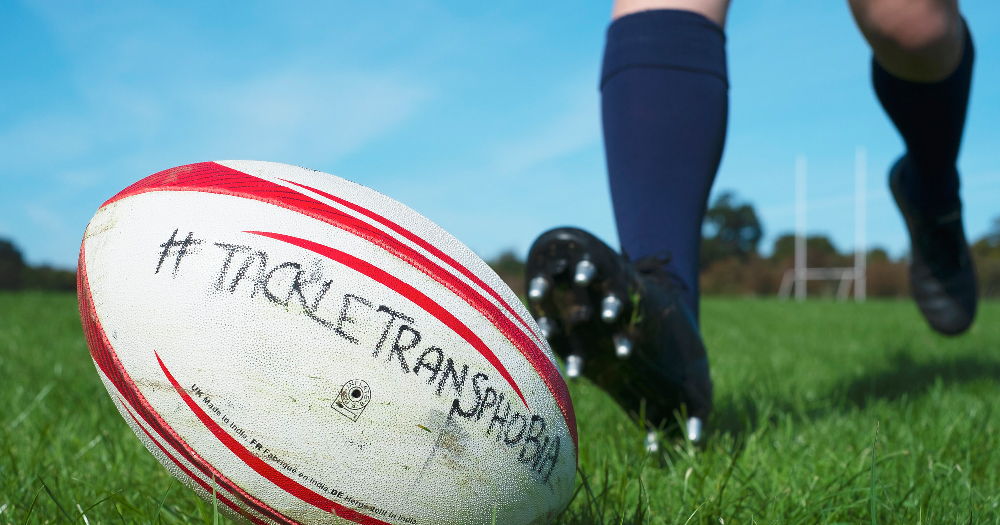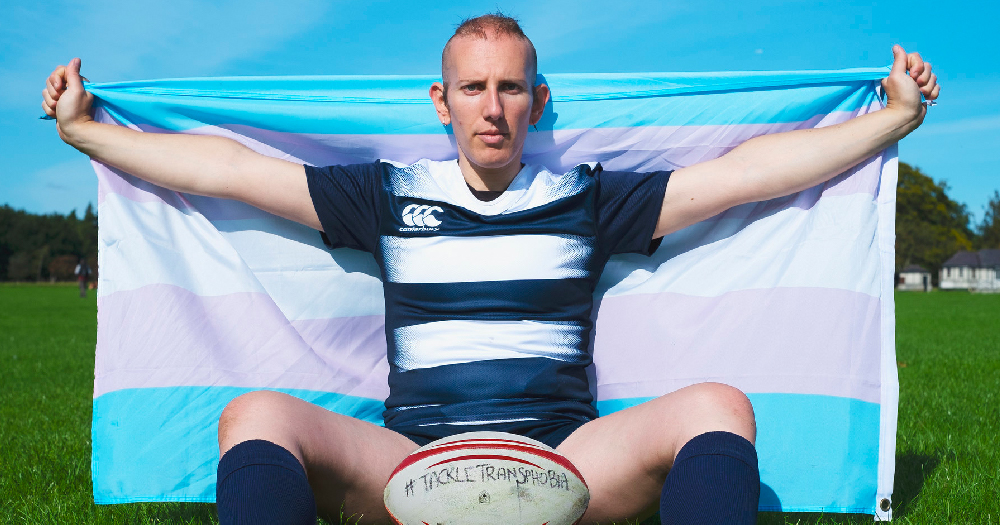Rugby’s global governing body, World Rugby, have made the decision to not allow trans women to participate in elite and international women’s rugby.
The new guidelines say that “the naturally acquired physical benefits that trans women receive by going through male puberty and the safety concerns for other female players” made trans women ineligible for competition.
However, it said trans men could compete in men’s contact rugby.
“Given the best available evidence for the effects of testosterone reduction on these physical attributes for transgender women, it was concluded that safety and fairness cannot presently be assured for women competing against transwomen in contact rugby,” World Rugby said in a statement.
World Rugby said it will be reviewing the decision annually and that national unions can make their own decision to allow trans women to compete at a community level.
“We are asking rugby clubs at all levels of the game to stand with us against a ruling that is exclusionary and that will impact some of the most vulnerable people in the community”.
Join us and @LgbtiqS in calling @WorldRugby to #TackleTransphobia https://t.co/Y0ngO2VbQE pic.twitter.com/Qj8KSdOL5S
— Stonewall (@stonewalluk) August 21, 2020
Following the decision, US trans rugby player Grace McKenzie said that World Rugby had adopted a transphobic policy “lacking supporting evidence and rooted in poor science.”
“This … calls into question their guiding principles of diversity and inclusion, and puts them behind all other international governing sport bodies in creating a welcoming environment for their athletes,” McKenzie said in a statement.
McKenzie had launched a petition when she learned about the recommended changes earlier this year to keep rugby open to trans women athletes which received over 18,000 signatures.
Trans scientist, researcher and athlete Joanna Harper opposed the new rules but claims that there would be few consequences as there are currently no trans women playing rugby at an international level.
“It’s unlikely to affect too many trans women, if any,” Harper told the Thomson Reuters Foundation.
World Rugby Chairman Sir Bill Beaumont said he is committed to regularly reviewing the guidelines in future.
“Rugby is a welcoming and inclusive sport and, while this has been a difficult decision to make, it has been taken… for the right reasons, given the risk of injury,” he said in a statement.
Following the ruling, USA Rugby released a statement to say their policy “remains unaffected for transgender athletes competing domestically in the United States.”
“USA Rugby continues to recognise transgender athletes and every diverse member represented across the rugby community, where driving the value of inclusivity will remain paramount. Rugby is, and will continue to be, a sport for all in the United States,” the statement concluded.
Giulia Valentino (pictured above) is originally from Italy but now lives in Ireland. She started playing rugby two months ago after her transition.
“I didn’t feel comfortable joining a team before the transition. I love the game, though it is not very popular in Italy. I love the inclusiveness rugby has historically shown as its core value.
“It immediately became very important for my mental health; I have never felt as included as I feel now.”

Giulia says the decision made by World Rugby could create stigma in the game she loves.
“Honestly, I don’t think I have any advantage over my teammates, some of them are stronger, others are faster. This game requires a lot of different body shapes to meet the needs of the different roles and you can find a 50kg gap even between two cisgender players.
“It seems that science can’t answer a lot of the questions on that matter. There are plenty of academics who stand against the ban and several unions over the world are opposing the decision and letting trans women play at grassroots level, including World Rugby.
“I really hope that the Irish Rugby Football Union (IRFU) will officially do the same soon.
“[World Rugby’s] decision risks making trans players look like intruders even on levels they are permitted to play.
“Furthermore this ban goes against International Olympic Committee (IOC) regulations.
“A lot of work is still to be done and to take this decision now, one month before it was due to be discussed, sounds very prejudicial and since it doesn’t have solid scientific support, it looks discriminatory too.”
Reacting to the news, Philippa Ryder of Sporting Pride Ireland said the research that led to this “disappointing” ruling “bears little relevance to questions of safety and fairness in rugby”.
“Sporting Pride is very disappointed with the recent decision of World Rugby to exclude trans women from elite and international rugby. It is vital to understand that World Rugby have based their conclusions on hypothetical data modelling and this bears little relevance to questions of safety and fairness in rugby.
“If rugby, or any sport, is to be truly inclusive everyone should be accepted and policies should be based on robust evidence which is developed in conjunction with the lived experiences of trans people who actually compete.
“Athletic ability changes and develops over time and there is still much to learn about the effect of transition in this regard.
“Sporting Pride applauds the continued inclusive policies of the Canadian, US and Australian Rugby Boards who are supportive of our trans colleagues. Let’s all welcome everyone to play the sport they want in the gender they identify in.”
© 2020 GCN (Gay Community News). All rights reserved.
Support GCN
GCN is a free, vital resource for Ireland’s LGBTQ+ community since 1988.
GCN is a trading name of National LGBT Federation CLG, a registered charity - Charity Number: 20034580.
GCN relies on the generous support of the community and allies to sustain the crucial work that we do. Producing GCN is costly, and, in an industry which has been hugely impacted by rising costs, we need your support to help sustain and grow this vital resource.
Supporting GCN for as little as €1.99 per month will help us continue our work as Ireland’s free, independent LGBTQ+ media.
